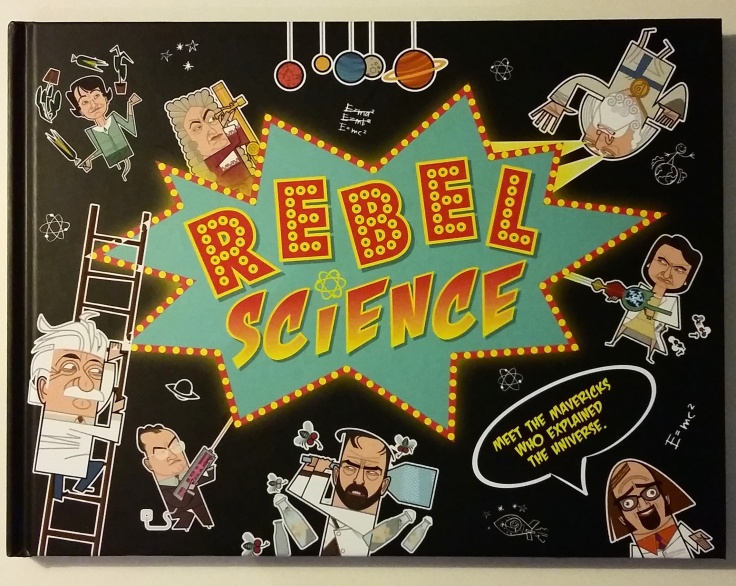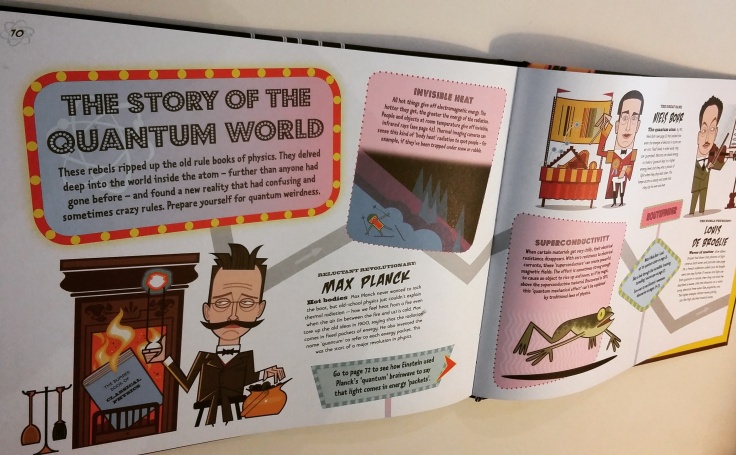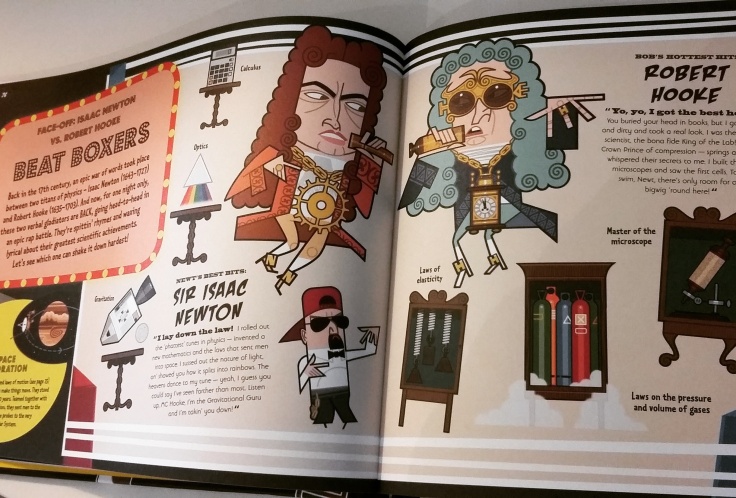It could be so easy to set out the historical facts about scientific discoveries in black and white, who discovered what etc, but science is not like that. Science is not black and white and neither is this brilliant non-fiction book from Dan Green, Rebel Science. Illustrated by David Lyttleton and Published by Weldon Owen, Rebel Science is a no-holds-barred expedition down the crazy, bumpy road that is science.

In this science book with a difference we are introduced to the mavericks of science, the braniacs and boffins behind the biggest discoveries about our world. Dan Green gives us all the juicy details of how they got to them, including the crazy mistakes they made on the way.
A wide range of scientific topics are covered in this book, from atoms to anatomy, genetics to germs and more. Each one begins with a Vegas style sign that marks the beginning of the road to discovery. Along the road we bump into the significant scientists in the field in chronological order with a description of the major work they carried out, the theories they held and the sometimes questionable experiments they carried out. The book is fast paced keeping the excitement of discovery going throughout. Along each road there are the dead-ends that that have sent scientists down the wrong path, my favourites are the once held beliefs that “mice come from sweaty underwear and that snakes could be made from putting straw into a pail of fresh milk.”

The road to discovery is not a straight one and you are invited to hop off at various points, to take detours to other areas or stop off to find out more. Each topic contains Key Discovery boxes with bullet points which nicely summarise what we know. We also delve deeper into some theories or scientists work with whole double pages dedicated to the role of the digestive system or Louis Pasteur’s germ lab for instance.
The topics of science and discovery are covered in so many brilliant ways in this book but I particularly like the face-off fights between scientists with conflicting theories or even just over who was the best at their job. The beat boxing battle between Sir Isaac Newton and Robert Hooke is particularly funny!

The illustrations are fun and comic like, really age appropriate for older primary and younger secondary school aged children. They complement the text perfectly, I remember when I was taking my Science GCSE that any books with funny snippets or great illustrations really helped to keep me engaged in what was sometimes a hard topic to get excited about. The description and illustration of Sanctorius Sanctorius who spent 30 years weighing everything that went in his mouth and everything that came out of the other end is a great example of this, sure to delight and disgust everyone!
Whilst my children are a bit too young for this book my older boy has enjoyed looking through it and is really interested in the digestive system page. He asks me to read him “the tummy story” and is fascinated by the journey of his food. He even remembers how long it takes for his food to get to his stomach from his mouth.
We’ve found ourselves looking at quite a few non-fiction books of late, they are a priceless companion for a parent of a very inquisitive three year old! So, it is great to review some and hopefully help to raise their profile. Although, I do wonder why so often the authors and illustrators names aren’t included on the cover.
This book should be in all school libraries, a great reference book for children to read themselves but also so useful for teaching and as a springboard for discussions. Dan Green and David Lyttleton have created an engaging and entertaining look at science that blows the cobwebs off what could be a very dry subject for children. Something that stood out for me alongside the brilliantly presented facts was the emphasis on the bare bones of what science is. Science doesn’t have all the answers, we are still and will still carry on learning by questioning what we know. Science is one of the places where being wrong is positive! All the rebels in this book pushed the boundaries, went against the majority and dared to be different. Great ideas to pass on to young people, Science makes rules but at the same time it exists to break them.
Many thanks to Weldon Owen for sending a copy of Rebel Science for review.
Follow @Acornbooks

This looks like a fun way to introduce children to scientific concepts. I’m starting so struggle with answering some of my 8 year old’s questions so it would be a useful reference for me too!
#readwithme
LikeLiked by 1 person
Definitely, I struggle now with my 3 year old’s questions, goodness knows what I’ll do when he’s 8!
LikeLiked by 1 person
Looks like a great book for children who are interested in science or for those who need a little boost. The illustrations look great, and I love that it has a humorous side too. #readwithme
LikeLiked by 1 person
The humour side of the book is a winner, it makes it so much more accessible. Thanks for reading and commenting 🙂
LikeLiked by 1 person
This looks really interesting and entertaining. I can imagine my 12yo son enjoying this.
LikeLiked by 1 person
I think your 12 year old would be just the right age for it! Thanks for reading and commenting 🙂
LikeLiked by 1 person
This looks fantastic, definitely a book to get kids excited about the subject of Science, my 10 year old would love it. Thanks for sharing with #ReadWithMe
LikeLiked by 1 person
There is so much content and definitely great for a 10 year old! #readwithme
LikeLiked by 1 person
Reblogged this on dangreenbooks and commented:
Many thanks to Acorn Books blog for a fantastic write-up of Rebel Science. I am particularly taken that @acornbooks caught the “emphasis on the bare bones of what science is”. The last paragraph says it better than I could:
” Science doesn’t have all the answers, we are still and will still carry on learning by questioning what we know. Science is one of the places where being wrong is positive! All the rebels in this book pushed the boundaries, went against the majority and dared to be different. Great ideas to pass on to young people, Science makes rules but at the same time it exists to break them.”
LikeLike